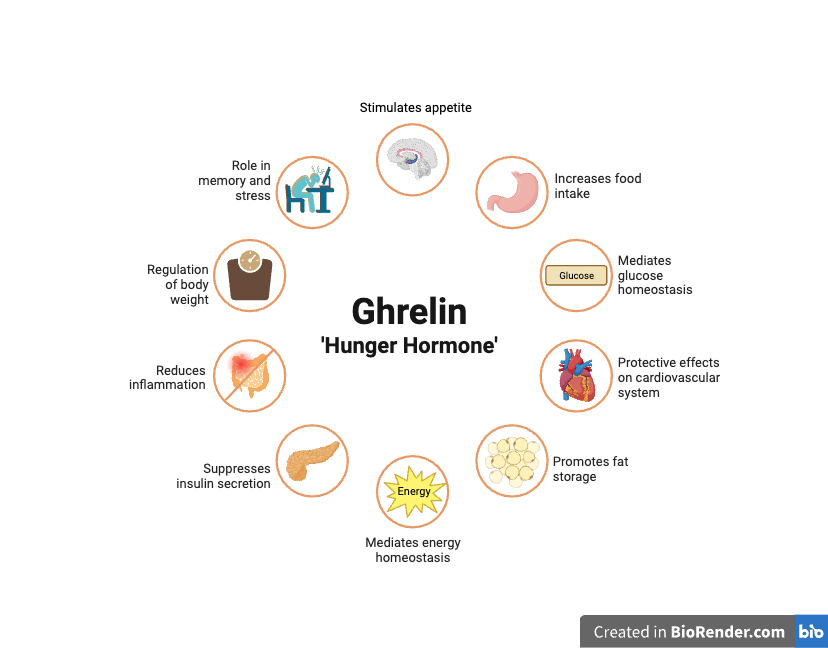Ghrelin (Ghl)

Ghrelin (Ghl): The Hunger Hormone and Its Role in Appetite Regulation
Ghrelin (Ghl), often referred to as the “hunger hormone,” is a peptide hormone primarily produced by the stomach, with smaller amounts released by the small intestine, pancreas, and brain. It plays a crucial role in regulating appetite, energy balance, and metabolism. Below is an overview of ghrelin’s functions, its relationship with obesity, and its clinical significance.
Functions of Ghrelin
Appetite Regulation:
- Ghrelin signals the hypothalamus in the brain when the stomach is empty, stimulating hunger and increasing food intake[3][6].
- Levels rise before meals and decrease after eating[4][6].
Energy Balance:
- Promotes fat storage and reduces metabolic rate, helping the body conserve energy during fasting or caloric restriction[5][6].
Other Roles:
- Influences reward-seeking behavior, taste sensation, and sleep-wake cycles[3][4].
- Stimulates growth hormone secretion via its effects on somatotroph cells in the pituitary gland[1].
Ghrelin and Obesity
Ghrelin Levels in Obesity:
- Contrary to expectations, ghrelin levels are typically lower in individuals with obesity compared to lean individuals[4][6].
- However, people with obesity may have increased sensitivity to ghrelin or an overactive ghrelin receptor (GHS-R), leading to heightened hunger despite lower circulating levels[3][5].
Impact on Weight Loss:
- Diet-induced weight loss increases ghrelin levels as a defense mechanism against starvation, making it harder to maintain weight loss[3][4][5].
Therapeutic Potential:
- Ghrelin receptor antagonists or inverse agonists are being explored as anti-obesity treatments to block hunger signals and reduce calorie intake[1][5].
Clinical Significance
Conditions Associated with High Ghrelin Levels:
- Prader-Willi syndrome: Characterized by severe obesity and extreme hunger due to elevated ghrelin levels[4].
- Cachexia and anorexia nervosa: High ghrelin levels may stimulate appetite as a compensatory response to weight loss[4].
Effects of Bariatric Surgery:
- Gastric bypass surgery reduces ghrelin production by shrinking the stomach, leading to decreased hunger and aiding weight loss[5].
- Chronic stress increases ghrelin secretion, contributing to stress-related overeating and weight gain[8].
Conclusion
Ghrelin is a key regulator of hunger and energy balance, playing a significant role in both normal physiology and metabolic disorders like obesity. Understanding its mechanisms has opened avenues for developing targeted therapies to manage obesity and related conditions.
Consult with Our Team of Experts Now!
At DrStemCellsThailand (DRSCT)‘s Anti-Aging and Regenerative Medicine Center of Thailand, we emphasize comprehensive evaluations and personalized treatment plans of Cellular Therapy and Stem Cells for managing various health conditions. If you have questions about Ghrelin or would like more information on our services, consult with our experts today!
Consult with Our Team of Experts Now!
References
- Title: The Role of Ghrelin in Appetite Regulation and Body Weight Control
DOI: 10.1111/j.1467-789X.2006.00270.x
Summary: This review explores the interplay between ghrelin and leptin in regulating food intake and body weight, highlighting their roles in appetite signaling and energy balance. - Title: Targeting the Ghrelin Receptor for Obesity Management
DOI: 10.3390/ijms18020273
Summary: Discusses the potential of ghrelin receptor antagonists as therapeutic agents for obesity, focusing on their mechanisms of action and clinical implications. - Title: Ghrelin and Its Role in Stress-Induced Eating Behaviors
DOI: 10.1210/en.2019-00347
Summary: Examines the role of ghrelin in stress-related overeating, with insights into its effects on reward pathways and emotional eating.















